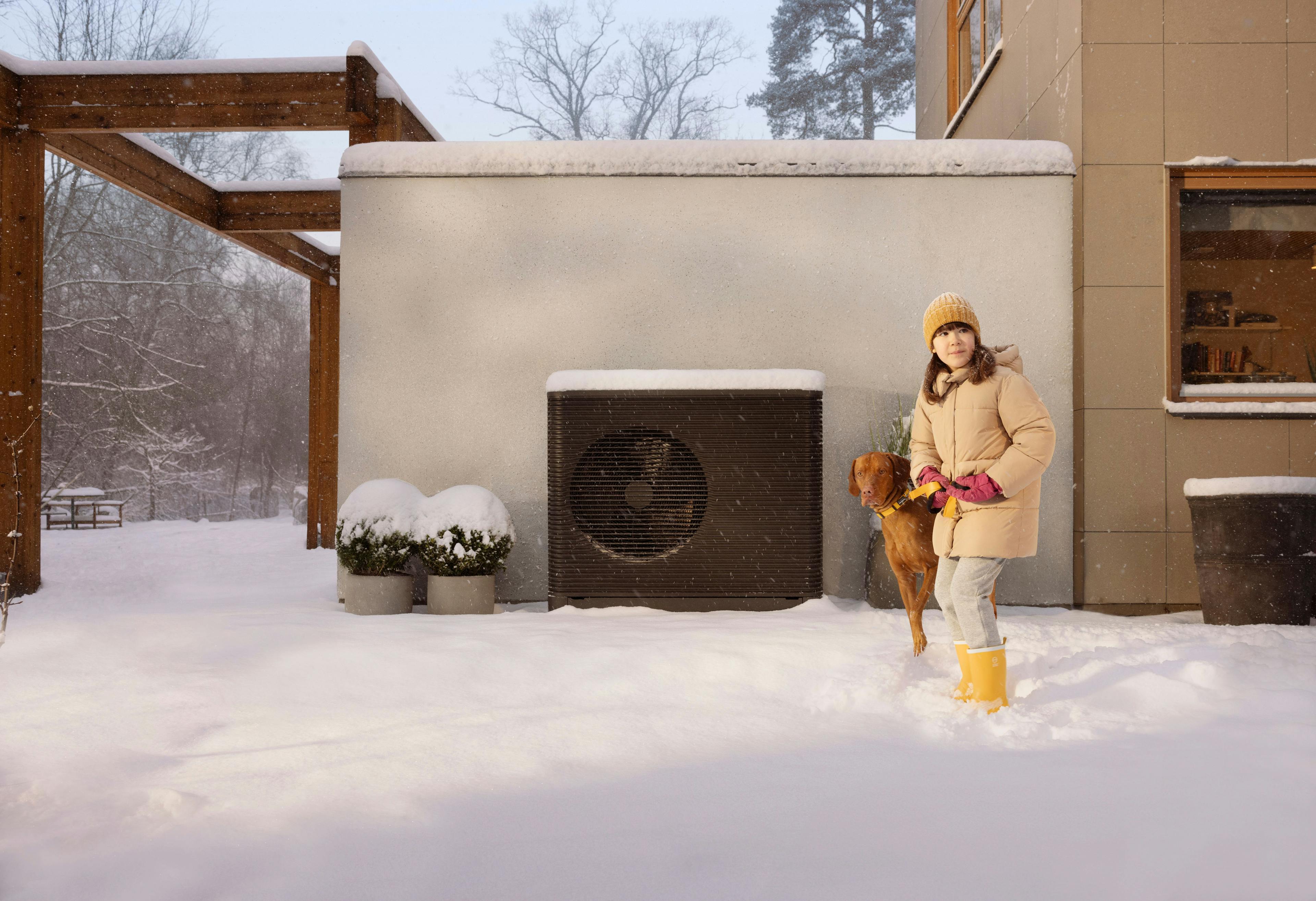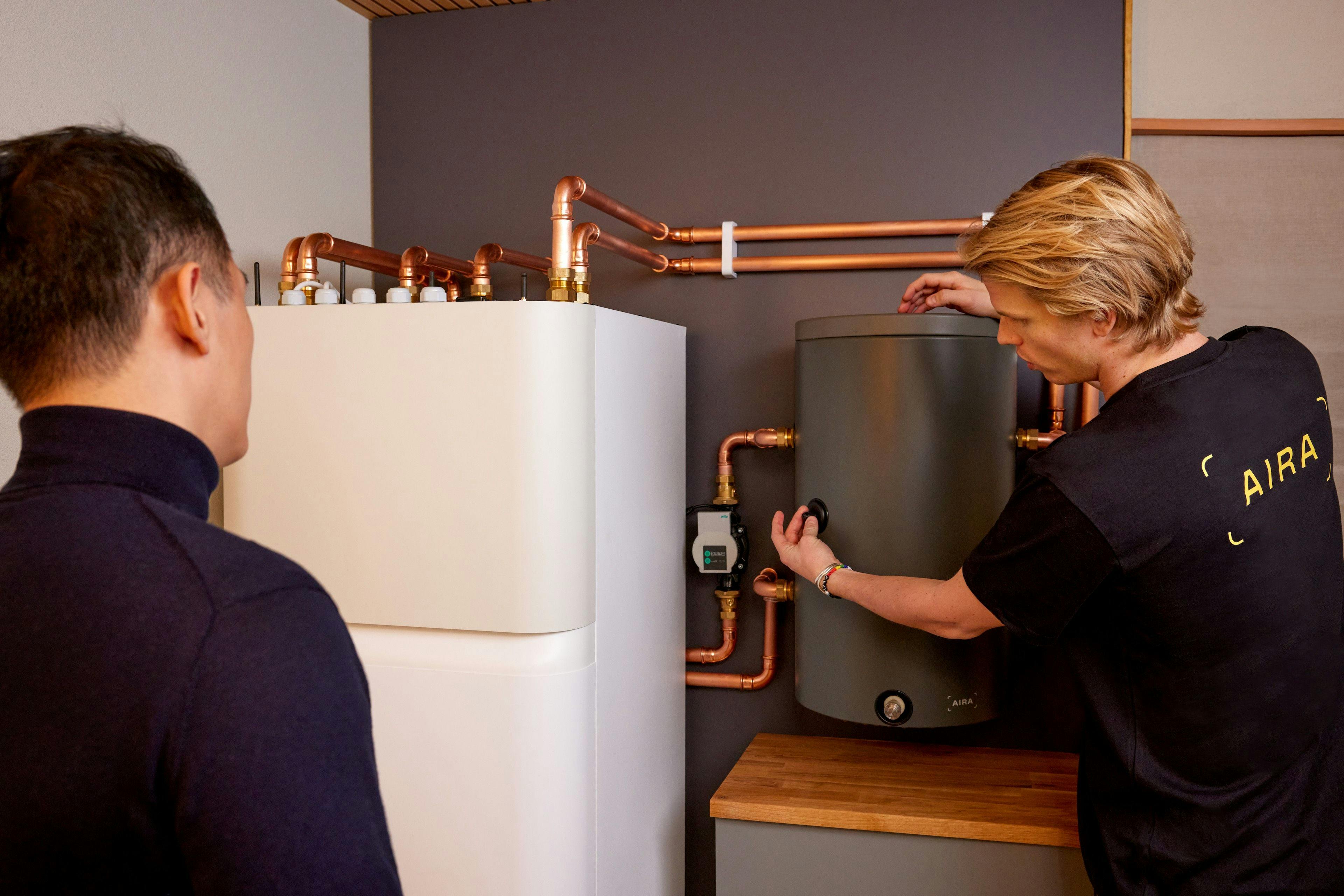Saving redundant gas boilers from the scrap heap: Aira meets The Salvage Sister
Today, residential heating is Europe’s third-largest emitter of CO₂ and is responsible for 16% of the UK’s CO₂ emissions…
Read more
Content Writer : Carl Robinson
Source Article : https://www.airahome.com/en-gb/blog/high-temperature-heat-pumps
When researching which heat pump is right for your home, you may have come across high temperature heat pumps as a viable option to replace your old fossil-fuel-burning boiler. However, before choosing a high temperature heat pump, it’s important to learn about its limitations when compared to a more efficient low temperature heat pump.
High temperature heat pumps are designed to heat water to temperatures similar to those produced by traditional fossil fuel boilers (around 60°C to 80°C). This ability often negates the need to pay for additional upgrades, like new radiators, when you install a heat pump.
While not having to fork out for additional infrastructure appears like an enticing benefit, this quality is a short-term gain, as high temperature heat pumps need more energy to heat your home’s water to higher temperatures. More energy means more electricity and more electricity means higher costs.
Another reason for the high temperature heat pump’s popularity stems from the myth that low temperature heat pumps can’t adequately warm a home all year round. While this is simply not the case (we even guarantee a consistent cosy temperature with our Comfort Guarantee), this concern often leads to consumers opting for a high temperature heat pump.

The majority of heat pumps on the market can heat water used for taps and showers to similar temperatures to those produced by gas or oil boilers (about 60°C to 70°C). Although these temperatures are unnecessary considering anything over 45°C at the point of use (tap or shower) can cause scalding.
The key difference between the two is that a low temperature air to water heat pump is designed to heat water used for radiators and/or underfloor heating at lower temperatures (around 35°C to 55°C) than a high temperature heat pump (around 60°C to 80°C). As a result, low temperature heat pumps are typically more efficient and cheaper to run than a high temperature heat pump.
Low temperature heat pumps are also, on average, 10% cheaper to purchase than a high temperature heat pumps. Although, if you need to install new radiators as part of your low temperature heat pump system, these upfront costs can be similar.
While high temperature heat pumps can offer some short-term advantages, it’s essential to consider their drawbacks before making a decision.
Versatility: High temperature heat pumps can produce hot water at lower and higher temperatures, making them suitable for various applications, including showers, baths, and general heating. Additionally, storing hot water at higher temperatures can potentially provide more hot water capacity, especially when used with mixer taps.
Compatibility: They can integrate seamlessly with existing heating systems, minimising the need for additional infrastructure upgrades like radiators and insulation.
Quick installation: Because they require fewer infrastructure upgrades, the installation of a high temperature heat pump can be quicker than a low temperature heat pump system.
Immediate Heat: High temperature heat pumps ensure rapid response times for periods of high heating demands.
Energy Intensive: Achieving high temperatures requires significant energy input, leading to increased energy consumption and higher operating costs.
Environmental Impact: The energy-intensive nature of high temperature heat pumps may contribute to higher carbon emissions, negating some of the environmental benefits of using renewable energy sources.
Upfront costs: High temperature heat pumps are about 10% more expensive than low temperature heat pumps.
Long-Term Expenses: While high temperature heat pumps may offer immediate benefits, the ongoing energy expenses can outweigh the initial cost savings over time.

Some articles on the subject claim that high temperature heat pumps are similarly – or more – efficient than low temperature heat pumps because they use superior refrigerants, like R290 or R32.
While this may have been the case a few years ago, modern low temperature heat pumps (like the Aira Heat Pump) use the same eco-friendly efficient refrigerants. As a result, high temperature heat pumps are typically less efficient than low temperature heat pumps because they use more energy to heat water to a higher temperature.
To illustrate this efficiency contrast further, we can link SCOP values (Seasonal Coefficient of Performance) to specific flow temperatures of each type of heat pump.
For high temperature heat pumps, typically operating at flow temperatures between 60°C to 80°C, the SCOP ranges from 2 to 2.5. This indicates that for every unit of electricity consumed, the heat pump generates 2 to 2.5 units of free energy from the air.
In contrast, low temperature heat pumps (like ours), operating at lower flow temperatures of around 35°C to 55°C, boast an impressive SCOP of above 4.7. This remarkable efficiency makes them four times more efficient than gas or oil boilers, and twice as efficient as their high temperature counterparts. Explore how air source heat pumps stack up against gas boilers.
High temperature heat pumps utilise the same innovative technology found in all heat pumps, harnessing thermal energy to efficiently heat both your home and water. However, to heat water to higher temperatures, there are four ways they could differ.
Enhanced components: High temperature heat pumps are equipped with specialised components, including more robust compressors and heat exchangers, capable of handling higher temperatures and pressures. These components are designed to efficiently extract heat from the ambient environment and transfer it to the water circulating within the system.
Increased refrigerant capacity: High temperature heat pumps often utilise refrigerants with higher critical temperatures and greater heat-carrying capacities. This allows them to operate effectively at elevated temperatures without compromising performance.
Optimised control systems: These heat pumps are equipped with sophisticated control systems that continuously monitor and adjust operating parameters, such as compressor speed, refrigerant flow rate, and defrost cycles, to optimise heating performance and energy efficiency.
Supplementary heating elements: In some cases, high temperature heat pumps may incorporate supplementary heating elements, such as electric resistance heaters or gas-fired boilers, to boost water temperatures when necessary, particularly during periods of high demand or extreme weather conditions.
A high temperature heat pump, like Octopus Energy’s Cosy 6 heat pump or Daikin’s Altherma 3 High Temperature heat pump, can be the right option for homes that don’t want to upgrade their existing infrastructure to accommodate a low temperature heat pump.
However, while there may be some initial cost savings in the short term, a high temperature heat pump will likely cost more money to run in the long run compared to a low temperature heat pump. Use our heat pump cost calculator to see how much a low temperature Aira Heat Pump could cost for your property.